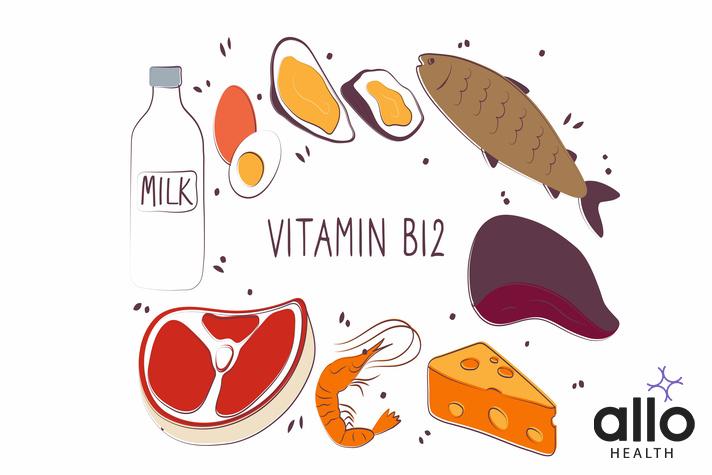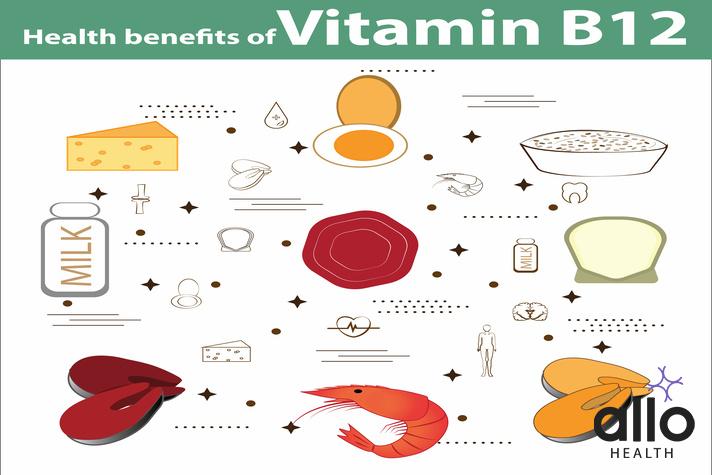What Are Some Vitamin B12 Rich Foods?

Allo Health is dedicated to personalized well-being, offering support and trusted information tailored to individual health goals. The platform emphasizes human-generated content, led by a distinguished medical team of experts, including physicians and sexual health specialists. Their commitment to credibility involves rigorous fact-checking, authoritative research, and continuous updates to ensure accurate, up-to-date information. Allo Health's unique approach goes beyond conventional platforms, providing expert-led insights and a continuous commitment to excellence, with user feedback playing a crucial role in shaping the platform's authoritative voice.

Dr Dodda Basavaraj did his MBBS from Vijayanagara Institute Of Medical Sciences, Ballari . His domain of interest always lied in obstetrics , gynaecology and sexual health. He has worked as Medical officer, Tele-consultation doctor at tertiary and primary health care sectors in Karnataka . He believes strongly in medical practice which is evidence based, non-judgemental and patient centric.
Why This Was Upated?
Our experts continually monitor the health and wellness space, and we update our articles when new information became available.
Updated on 15 September, 2023
- Article was updated as part of our commitment to diversity, equity, and inclusion.

"The following blog article provides general information and insights on various topics. However, it is important to note that the information presented is not intended as professional advice in any specific field or area. The content of this blog is for general educational and informational purposes only.
Book consultation
The content should not be interpreted as endorsement, recommendation, or guarantee of any product, service, or information mentioned. Readers are solely responsible for the decisions and actions they take based on the information provided in this blog. It is essential to exercise individual judgment, critical thinking, and personal responsibility when applying or implementing any information or suggestions discussed in the blog."
Disclaimer: The following blog article discusses food and diet-related information for general educational purposes. However, it is important to note that the information provided is not intended as personalized dietary advice and should not be considered a substitute for professional guidance from a registered dietitian or qualified healthcare professional.
Before making any significant changes to your diet or nutrition plan, it is recommended to consult with a registered dietitian or healthcare professional. Dietary changes can have a significant impact on your overall health and well-being. It is important to approach any changes to your diet in a balanced and sustainable manner, ensuring that you meet your nutritional needs and avoid any potential nutrient deficiencies. Rapid or extreme changes in dietary patterns can be detrimental to your health and may require professional guidance.
It is crucial to note that any specific dietary recommendations or guidelines mentioned in this article may not be appropriate for individuals with specific medical conditions, allergies, or intolerances. A registered dietitian or healthcare professional can provide individualized advice, including modifications or alternative food choices to accommodate your unique circumstances. The information provided in this article may not encompass all possible dietary considerations or account for the latest research and nutritional guidelines.
Vitamin B12 is an essential nutrient that plays several crucial roles in maintaining optimal health. From promoting red blood cell formation to supporting brain function, vitamin B12 is a vital nutrient that your body needs on a regular basis. Unfortunately, many people don’t get enough of this vitamin in their diets which can lead to a host of health problems. Before we get into vitamin B12 rich foods, let’s understand the vitamin.
What Is Vitamin B12?
Vitamin B12, also known as cobalamin, is an essential water-soluble vitamin that plays a crucial role in various bodily functions. It is a member of the B-vitamin family and is unique in its chemical structure compared to other B vitamins. Vitamin B12 is necessary for proper nerve function, DNA synthesis, red blood cell formation, and the metabolism of fatty acids and amino acids. Since the human body cannot produce this vitamin, it must be obtained through diet or supplements.
Here’s a detailed overview of vitamin B12:
- Chemical Structure: Vitamin B12 is a complex molecule containing a central cobalt atom surrounded by a corrin ring structure. The most common forms of vitamin B12 found in supplements and food are methylcobalamin and cyanocobalamin.
- Sources: Vitamin B12 is primarily found in animal-based foods, such as meat (beef, chicken, pork), fish (salmon, trout, tuna), shellfish (clams, oysters), eggs, and dairy products (milk, cheese, yogurt). Plant-based sources of vitamin B12 are scarce, and most of the plant-based foods claimed to contain B12 are usually fortified with synthetic forms.
- Absorption: Vitamin B12 absorption is a complex process that requires several steps. In the stomach, hydrochloric acid and an enzyme called pepsin help release the vitamin from the food. It then binds to a protein called intrinsic factor, which is produced in the stomach and essential for B12 absorption. The B12-intrinsic factor complex travels to the small intestine, where it is absorbed into the bloodstream.
- Role in the Body:
- DNA Synthesis: Vitamin B12 is crucial for the synthesis of DNA, the genetic material in all cells. It participates in the conversion of methylmalonyl-CoA to succinyl-CoA, a step required for DNA replication.
- Red Blood Cell Formation: Vitamin B12 is essential for the maturation and formation of red blood cells in the bone marrow. A deficiency in B12 can lead to megaloblastic anemia, where red blood cells become enlarged and ineffective.
- Nerve Function: B12 plays a vital role in maintaining the health of the nervous system. It is involved in the synthesis of myelin, a fatty substance that surrounds and protects nerve fibers, aiding in nerve impulse conduction.
- Homocysteine Metabolism: Vitamin B12, along with other B-vitamins, helps convert homocysteine into methionine, an amino acid necessary for various biochemical processes. Elevated homocysteine levels are associated with cardiovascular disease.
- Recommended Daily Intake: The recommended daily intake of vitamin B12 varies with age, sex, and life stage. For adults, it typically ranges from 2.4 to 2.8 micrograms (mcg) per day.
- Deficiency: Vitamin B12 deficiency can result from inadequate dietary intake, malabsorption concerns (e.g., pernicious anemia, certain gastrointestinal disorders), or reduced intrinsic factor production. Symptoms of deficiency may include weakness, fatigue, tingling or numbness in hands and feet, difficulty walking, memory problems, mood changes, and anemia.
- Supplementation: For individuals at risk of vitamin B12 deficiency or those following strict vegan diets (which lack natural B12 sources), supplements are available in various forms, including tablets, capsules, and injections.
Vtamin B12 is a vital nutrient essential for DNA synthesis, red blood cell formation, nerve function, and metabolism. Adequate intake of this vitamin is necessary to maintain good health and prevent deficiency-related conditions. If you suspect a deficiency, consult a healthcare professional for proper evaluation and guidance.

Vitamin B-12 Deficiency
Vitamin B12, also known as cobalamin, is an essential water-soluble vitamin that plays a crucial role in various bodily functions. It is necessary for the formation of red blood cells, DNA synthesis, proper nerve function, and the metabolism of certain fatty acids and amino acids. Vitamin B12 is not synthesized by the human body; instead, it is obtained exclusively from dietary sources or supplements.
Causes of Vitamin B12 Deficiency:
- Inadequate Intake: A lack of sufficient vitamin B12 in the diet, especially in individuals following strict vegetarian or vegan diets, can lead to deficiency.
- Malabsorption: Vitamin B12 is primarily absorbed in the ileum (the last part of the small intestine). Conditions that affect the absorption of nutrients in the small intestine, such as pernicious anemia, celiac disease, Crohn’s disease, or surgical removal of a part of the small intestine, can cause malabsorption of B12.
- Lack of Intrinsic Factor: Intrinsic factor is a protein produced in the stomach, and it is essential for the absorption of vitamin B12. Pernicious anemia is an autoimmune condition where the body produces antibodies against intrinsic factor, leading to impaired B12 absorption.
- Gastric Surgery: Surgeries that involve removing or bypassing parts of the stomach can disrupt the production of intrinsic factor and reduce B12 absorption.
- Chronic Use of Certain Medications: Long-term use of medications like proton pump inhibitors (PPIs) or H2 receptor antagonists, used to treat acid reflux and ulcers, can interfere with B12 absorption.
Symptoms of Vitamin B12 Deficiency: The symptoms of vitamin B12 deficiency can vary depending on the severity and duration of the deficiency. Common symptoms include:
- Fatigue and weakness
- Anemia (decreased red blood cells)
- Pale or yellowish skin
- Shortness of breath and dizziness
- Numbness or tingling in the hands and feet
- Difficulty walking and balance concerns
- Glossitis (inflammation of the tongue) and mouth ulcers
- Digestive issues like diarrhea or constipation
- Cognitive changes, such as memory loss or confusion
- Depression and mood disturbances
Complications of Vitamin B12 Deficiency: If left untreated, vitamin B12 deficiency can lead to severe complications, including:
- Pernicious Anemia: This type of anemia occurs when there is a lack of intrinsic factor, leading to inadequate B12 absorption and reduced red blood cell production.
- Neurological Problems: Long-term B12 deficiency can cause irreversible damage to the nervous system, leading to difficulty walking, balance issues, memory problems, and even psychosis.
- Cardiovascular Issues: Vitamin B12 deficiency can increase homocysteine levels, which is associated with an increased risk of heart disease.
Treatment of Vitamin B12 Deficiency: The treatment for vitamin B12 deficiency typically involves B12 supplementation. In mild cases, oral B12 supplements may be sufficient. For severe deficiencies or cases of malabsorption, B12 injections are often necessary to bypass the digestive system and deliver the vitamin directly into the bloodstream.
Prevention of Vitamin B12 Deficiency: To prevent vitamin B12 deficiency, individuals can:
- Consume a balanced diet that includes animal products such as meat, fish, poultry, eggs, and dairy, which are rich sources of B12.
- If following a vegetarian or vegan diet, consider fortified foods or B12 supplements.
- Treat any underlying medical conditions that may affect B12 absorption.
- If you’ve undergone gastric surgery or have a condition that affects B12 absorption, talk to your healthcare provider about appropriate supplementation.
If you suspect you have a vitamin B12 deficiency or are experiencing symptoms, it’s crucial to consult a healthcare professional for proper diagnosis and treatment. Self-diagnosis and supplementation without medical guidance can lead to other health issues or mask underlying conditions that need attention.
What Are Some Vitamin B12 Rich Foods?
Vitamin B12, also known as cobalamin, is an essential nutrient that plays a crucial role in various bodily functions, including red blood cell production, nerve function, and DNA synthesis. Since our bodies cannot produce Vitamin B12 on their own, we need to obtain it from dietary sources or supplements. Here are some Vitamin B12-rich foods:
- Shellfish: Shellfish are among the best sources of Vitamin B12. Clams, mussels, oysters, and crab are particularly high in B12. For example, a 3-ounce serving of cooked clams can provide well over 1000% of the daily recommended intake of Vitamin B12.
- Fish: Fish, especially oily fish, are good sources of Vitamin B12. Salmon, trout, sardines, herring, and tuna are some of the fish varieties that contain this nutrient. A 3-ounce serving of cooked salmon typically provides around 80-90% of the daily recommended intake of Vitamin B12.
- Meat: Meat is also rich in Vitamin B12. Beef, lamb, pork, and poultry, such as chicken and turkey, are good sources. Organ meats, like liver and kidney, are particularly high in B12.
- Eggs: Eggs, especially the yolks, are a good source of Vitamin B12. One large egg contains approximately 10-15% of the daily recommended intake of B12.
- Dairy Products: Dairy foods are a source of Vitamin B12. Milk, cheese, and yogurt contain varying amounts of B12. For example, a cup of plain yogurt can provide around 20% of the daily recommended intake.
- Fortified Foods: Many plant-based foods are not naturally rich in Vitamin B12, but some are fortified with it. Fortified breakfast cereals, plant-based milk (such as soy milk, almond milk, or oat milk), and nutritional yeast are common fortified sources.
- Nutritional Yeast: Nutritional yeast is a deactivated yeast commonly used as a cheese substitute in vegan diets. It is often fortified with Vitamin B12, making it a popular option for those following plant-based diets.
- Some Algae and Seaweed: Certain types of seaweed and algae, such as nori, can contain significant amounts of Vitamin B12. The absorption of B12 from these sources is debated, as they may also contain compounds that hinder absorption.
Vitamin B12 deficiency can lead to various health issues, including anemia and neurological concerns. If you’re following a strict vegetarian or vegan diet that doesn’t include any animal-derived products or fortified foods, you may need to consider taking Vitamin B12 supplements to meet your daily requirements. Always consult with a healthcare professional before starting any supplementation regimen.
Does Vitamin B12 Rich Food Help With Sexual Health?
Vitamin B12, also known as cobalamin, is an essential water-soluble vitamin that plays a crucial role in various bodily functions, including the nervous system, red blood cell formation, DNA synthesis, and metabolism. While there is some evidence to suggest that vitamin B12 may have a positive impact on sexual health, it’s important to note that its effects are not specific to sexual function alone and are part of overall health benefits.
- Nervous system function: Vitamin B12 is essential for maintaining a healthy nervous system. A well-functioning nervous system is crucial for transmitting signals between the brain and sexual organs, which can contribute to overall sexual health.
- Red blood cell production: Vitamin B12 is involved in the formation of red blood cells. Healthy blood flow is essential for sexual arousal and performance in both men and women.
- Energy levels: Vitamin B12 is involved in the metabolism of carbohydrates, proteins, and fats, helping to convert food into energy. Adequate energy levels are important for sexual desire and stamina.
- Libido: Some studies have suggested that a deficiency in vitamin B12 could be associated with a decrease in libido or sex drive. Correcting a deficiency might, in turn, have a positive impact on libido.
- Mood and mental health: Vitamin B12 plays a role in the production of neurotransmitters like serotonin and dopamine, which are involved in mood regulation. Good mental health and stable mood can positively influence sexual health and satisfaction.
- Hormone regulation: Vitamin B12 may have some influence on hormone regulation, which could indirectly affect sexual health, especially in cases where hormonal imbalances are contributing to sexual issues.
It’s essential to understand that while vitamin B12 may be beneficial for sexual health, its effects are not a cure-all for sexual concerns. If you are experiencing sexual health issues, it’s essential to consult a healthcare professional to determine the underlying causes and develop an appropriate treatment plan.
Vitamin B12 is naturally found in animal products such as meat (especially liver), fish, eggs, and dairy products. Some plant-based foods, such as fortified cereals and nutritional yeast, may also contain vitamin B12. If you follow a vegetarian or vegan diet, it’s crucial to ensure you get enough vitamin B12 through fortified foods or supplements, as a deficiency can lead to various health concerns beyond sexual health concerns.
Frequently Asked Questions
(1) What foods are rich in Vitamin B12?
Vitamin B12 is primarily found in animal-based foods. Some of the best sources include:
- Meat: Beef, lamb, and poultry are excellent sources of vitamin B12.
- Fish: Salmon, tuna, trout, and sardines contain significant amounts of vitamin B12.
- Shellfish: Clams, mussels, and crab are rich in this essential vitamin.
- Dairy products: Milk, cheese, and yogurt are good sources for lacto-vegetarians.
- Eggs: Including eggs in your diet can boost vitamin B12 intake.
(2) Are there any plant-based sources of Vitamin B12?
Natural plant-based sources of vitamin B12 are scarce. However, some fortified foods can be a part of a vegan or vegetarian diet to supplement vitamin B12 intake. These fortified options include:
- Plant-based milk: Some soy, almond, or coconut milks are fortified with vitamin B12.
- Breakfast cereals: Certain fortified cereals are available that contain vitamin B12.
- Nutritional yeast: A popular vegan condiment that can be sprinkled on dishes.
(3) How much Vitamin B12 do I need daily?
The recommended daily intake of vitamin B12 varies by age and life stage. For adults, the general guideline is approximately 2.4 micrograms per day. Pregnant and breastfeeding women may require slightly higher amounts. It’s important to check with a healthcare professional to determine the appropriate dosage for individual needs.
(4) Why is Vitamin B12 important?
Vitamin B12 plays a crucial role in maintaining overall health. It supports the formation of red blood cells and DNA synthesis. B12 is also essential for proper neurological function and helps prevent a type of anemia called megaloblastic anemia. Adequate vitamin B12 intake is vital for maintaining energy levels and cognitive function.
(5) Who is at risk of Vitamin B12 deficiency?
Certain groups of people are more susceptible to vitamin B12 deficiency, including:
- Vegans and vegetarians: Those who exclude animal products from their diet may lack sufficient B12 intake.
- Elderly individuals: Aging can affect the body’s ability to absorb B12 from food.
- Individuals with gastrointestinal disorders: Conditions like celiac disease or Crohn’s disease can hinder B12 absorption.
- People who have undergone weight loss surgery: Surgeries like gastric bypass can limit nutrient absorption.
Ensuring adequate vitamin B12 intake through a balanced diet or supplementation is crucial for those at risk of deficiency. Regular health check-ups can help detect and address any potential B12 deficiency early on.





































